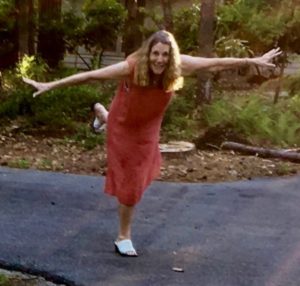We are living in a strange world these days. Only those of us old enough to remember living during the second world war can claim they have lived through such a confusing time. While we are being asked to “stay home” to battle the coronavirus, the idea that we can’t even see it, know where it is lurking, causes even more panic. While some of you feel frightened, many others seem to be in total denial, going about their business as though nothing is really happening, declaring their invincibility against this invader into our lives. My son was with such friends recently who laughed at his efforts to keep his hands free of germs and away from his face as we have been instructed. Before the restaurants closed in my state, while he was out with two of his friends, one ridiculed him for his hand washing and then dramatically took his own hands and wiped them across his face and laughed. Historically, a similar type of denial existed as the Nazis slowly infiltrated and took over country after country. Some panicked while many remained in denial. This is a really important time to find the right balance in order to defeat this invader we now face. How do you face this challenge? I was just wondering…………………
We have been given guidelines and we should follow them. If we don’t follow them, the virus will still spread and our healthcare system will be unable to handle this crisis. You cannot just think about yourself, because your behavior will affect all of us, and ultimately yourself if you don’t follow the guidelines. But we must also find productive ways to cope and continue to enjoy life through our dramatically changed world. So, get the information you need and then turn off the news and go about your day!
Well, people, I am an extrovert, and if I can find a way to do this, then so can you! My first advice is to stay busy. Stay in touch with your loved ones. Talk on the phone often, meet for walks at a distance, communicate online. Exercise, by walking, running, biking, or with your own home equipment. Dance! The movement combined with the music is exhilarating! Practice yoga. You can sign up for online classes or ask Alexa to open Yoga Studio. Learn to meditate. Alexa also has several programs for this. Read! Find all those books you never had time for and dive in! Think of this as the relaxing vacation you always wanted. Reorganize your closets and prepare a donation box with all those things you don’t need and don’t wear anymore. Enjoy the creative art of cooking again since you are no longer rushed to go here, there, and everywhere! Explore learning online. Look up subjects you were always curious about and delve into making new discoveries! Try a new hobby, like painting, quilting, knitting, collecting, woodworking. Try learning a musical instrument. Play cards and games with the people you are hunkered down with and relish the beauty of their company. Begin learning another language online. Watch some movies you never had time for. Organize your photos for an album or create a scrapbook. Breathe!! Go outside and savor the brush of the wind on your face as it frolics through your hair. Sit in a sunbeam as spring arrives and watch as the flowers begin to bloom. Clean up your yard. Begin a garden. If you are lucky like me, visit the beach, and if you don’t have a beach, I’m sure you can find a lake or a pond to calm your senses. Symphony orchestras are streaming online and a friend shared that she just viewed an opera this way as well. Take a virtual museum tour. The possibilities are endless.
The Theatre of the Absurd can teach us some worthy lessons at this time. There is something endlessly amusing about the absurdity of the human condition. I recommend that you find humor wherever you can and that you laugh at the absurdity of life. Laughter is healing and is the best medicine of all. It will get you through this! When I was 33, I became very ill with a puzzling illness. I was critically ill when I wound up in a major Boston hospital. I spent a month there recovering from major surgery. I had the best roommate! We laughed at everything. We laughed until our surgical scars hurt! We laughed when we pressed the call button and no one came. We laughed at everything that went wrong and also at everything that went right. Yes, you can laugh during hard times! Norman Cousins explains in Anatomy of an Illness how he overcame a terminal illness by laughing himself silly from watching old Marx Brothers movies. Laughter stimulates the production of enkephalins and endorphins, our natural brain opiates. It also boots our immune system, an important contributor to stress reduction.
Try journaling. I began my own journal March 14th, the first day after my last hurrah out at a restaurant. I am calling it Captive’s Log and I look forward to seeing what I will learn from this experience. This is also a useful tool for feeling expression during this challenging time. Journaling is an excellent tool for reflection, and what better time for a little soul searching than now? Consider how your life has recently changed, and while there are many things that you may miss, consider what new opportunities have entered your life. Also, consider which things you used to do that no longer feel important. Really do some thinking about the direction you would like your life to take! This is an opportunity that we don’t often have the time to think about. And during your contemplation, try to focus on gratitude. Those of you who have families with you during this “shelter-in” have a bounty of good fortune right before you. Keep a gratitude list and add to it every day. Focus on what you have, not on what you can’t have or can’t do right now. There are worse things than this.
If all else fails and you begin to feel depressed or discouraged, go into your bathroom, force a smile on your face, and look at yourself in the mirror. There is something magical about meeting yourself in the mirror with a smile. It will cast away all doubt and fear as the knowing part of you understands the frailty and absurdity, and ultimately knows that all will be well. This too shall pass, and like everything in life, is another opportunity for learning.
Can you see this opportunity that life is presenting you? Can you banish your fear and be open to new ideas? Can you take a balanced approach and meet the challenge that is facing us? Can you contribute to the human team with equanimity? Mostly this crisis is bringing out the best in us. We are uniting as one human family to help one another. Can you meet this challenge with courage, clarity, and determination? I was just wondering………………………..











